Key takeaways:
- Understanding the unique support needs of individuals with cerebral palsy requires a balanced focus on both physical and emotional well-being.
- Barriers in healthcare access include complex insurance processes, transportation challenges, and a lack of provider awareness about patients’ needs.
- Community knowledge and collaboration can significantly enhance access to necessary healthcare services, empowering families in their advocacy efforts.
- Personal networks, peer support, and persistent advocacy are crucial for navigating healthcare systems and securing appropriate care solutions.
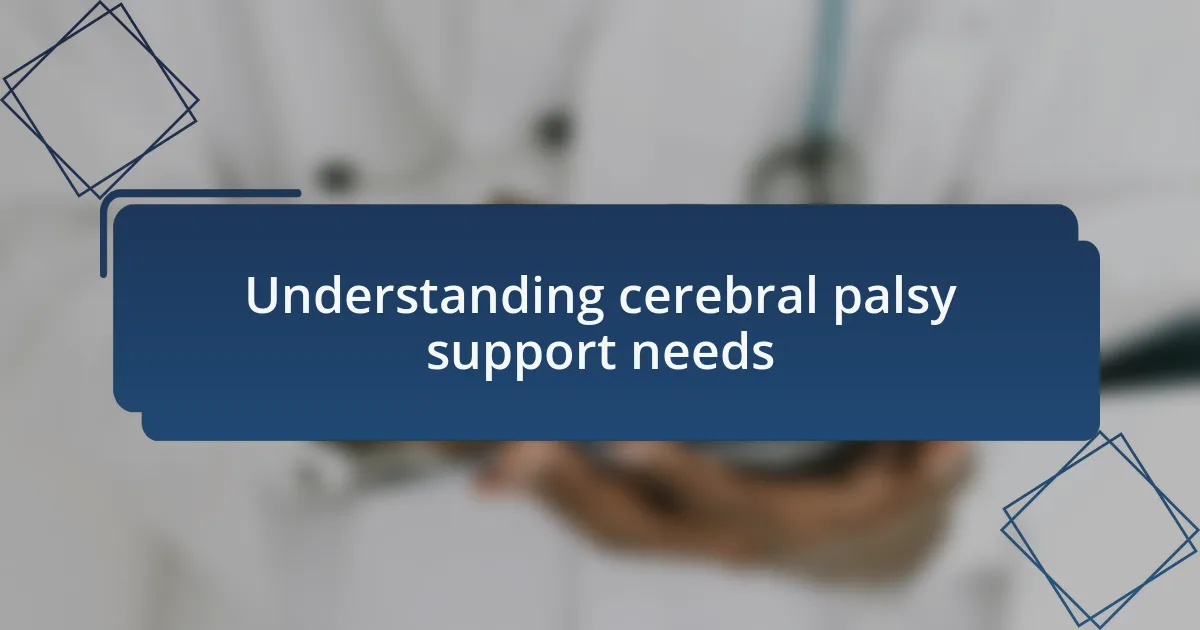
Understanding cerebral palsy support needs
When delving into the support needs of individuals with cerebral palsy, I often think about how each person’s journey is unique. I’ve met families who have shared how frustrating it can be to find the right therapies and resources that truly resonate with their child’s needs. Have you ever watched someone struggle to communicate their desires? It’s heart-wrenching, and it emphasizes the importance of tailored support in fostering independence.
In my experience, understanding the physical and emotional challenges faced by individuals with cerebral palsy is paramount. I recall a workshop where a young adult expressed how crucial emotional support was in her life, especially during her transition to adulthood. It made me realize that while physical therapy is essential, emotional well-being is just as critical; how often do we prioritize one over the other?
Additionally, engaging with the community can unveil unforeseen support needs. One day at a local meet-up, I noticed parents exchanging tips on adaptive tools that weren’t on any professional radar. It drove home the point: community knowledge can be a goldmine for support. How might we harness that collective wisdom to create more comprehensive support systems for everyone involved?
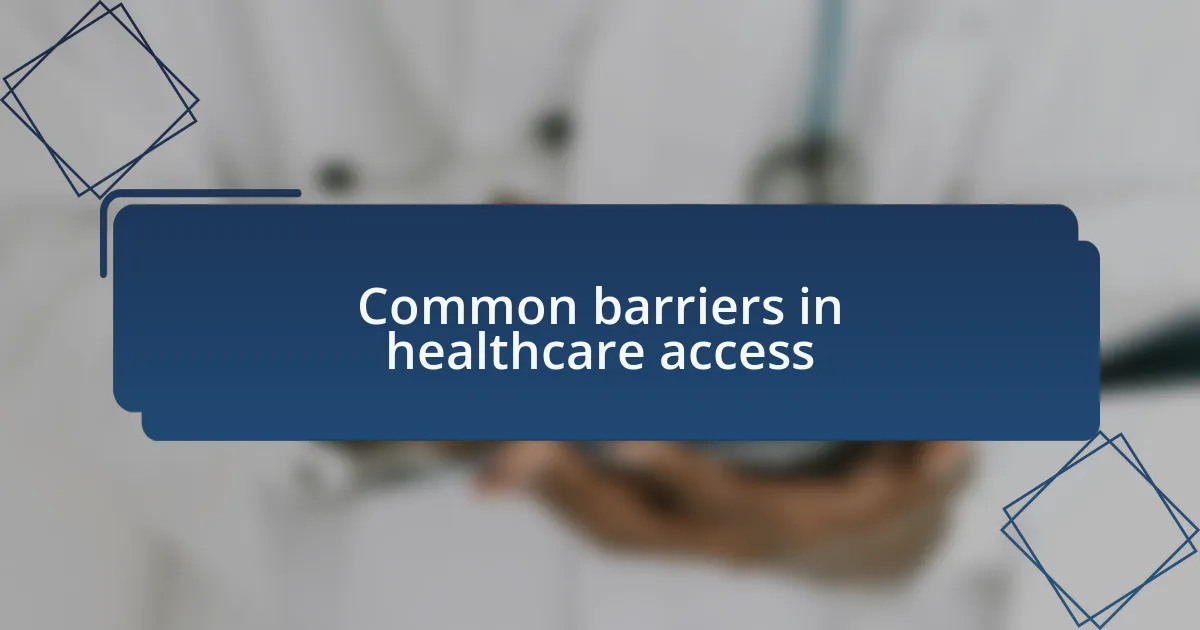
Common barriers in healthcare access
Accessing healthcare can often feel like navigating a maze, particularly for those with cerebral palsy. One barrier I’ve witnessed firsthand is the overwhelming complexity of insurance coverage. A friend of mine struggled for months to get therapy sessions approved, simply because her provider didn’t recognize the value of tailored interventions. Can you imagine the frustration of needing help but facing bureaucratic roadblocks instead?
Transportation also plays a significant role in access to healthcare services. I remember accompanying a family to an appointment that was nearly two hours away, all because their local clinic lacked specialists familiar with cerebral palsy. This experience highlighted for me how transportation challenges can drastically limit timely access to care, leaving families feeling isolated and overwhelmed.
Moreover, there’s often a lack of awareness or sensitivity among healthcare providers regarding the unique needs of individuals with cerebral palsy. At a recent clinic visit, I overheard a doctor underestimating the potential of a patient due to their condition rather than focusing on their capabilities. It struck me that these attitudes can create an invisible barrier, making it even harder for individuals to receive the compassionate care they deserve. How can we foster a healthcare environment that truly understands and values each patient’s potential?
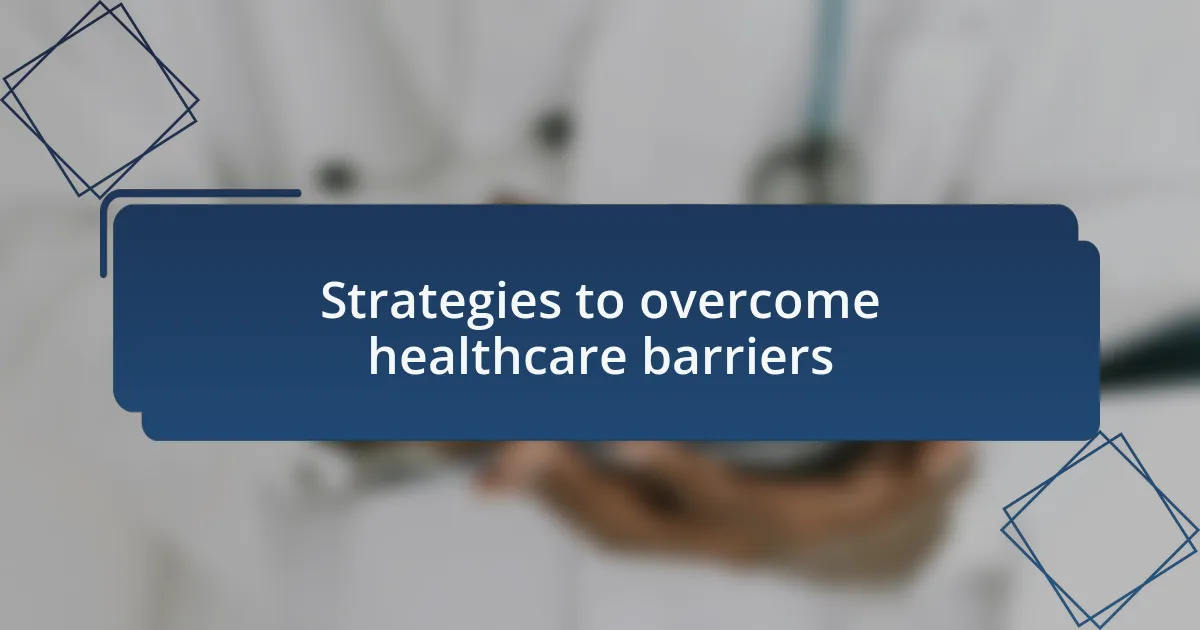
Strategies to overcome healthcare barriers
Addressing barriers in healthcare requires innovative strategies that empower patients and their families. In one instance, I facilitated a community workshop aimed at educating families about how to advocate for necessary services. It was inspiring to watch those who had felt unheard transform into confident advocates for their loved ones, challenging the status quo and demanding the care they deserved. How can simply sharing knowledge shift the dynamic in healthcare?
Additionally, leveraging technology can bridge significant gaps in access. I recall a mother who used telehealth services to connect with a specialist after exhausting local options. This approach not only saved her travel time but also allowed her to consult with a provider who truly understood her child’s needs. Isn’t it remarkable how a simple video call can open up new possibilities for care?
Collaboration across different sectors also plays a critical role. In another example, local healthcare providers teamed up with transportation services to offer rides for patients needing specialty care. This partnership made a world of difference for families who were previously unable to attend appointments due to transportation barriers. Can you imagine the relief families must feel knowing that getting to essential healthcare is no longer an obstacle?
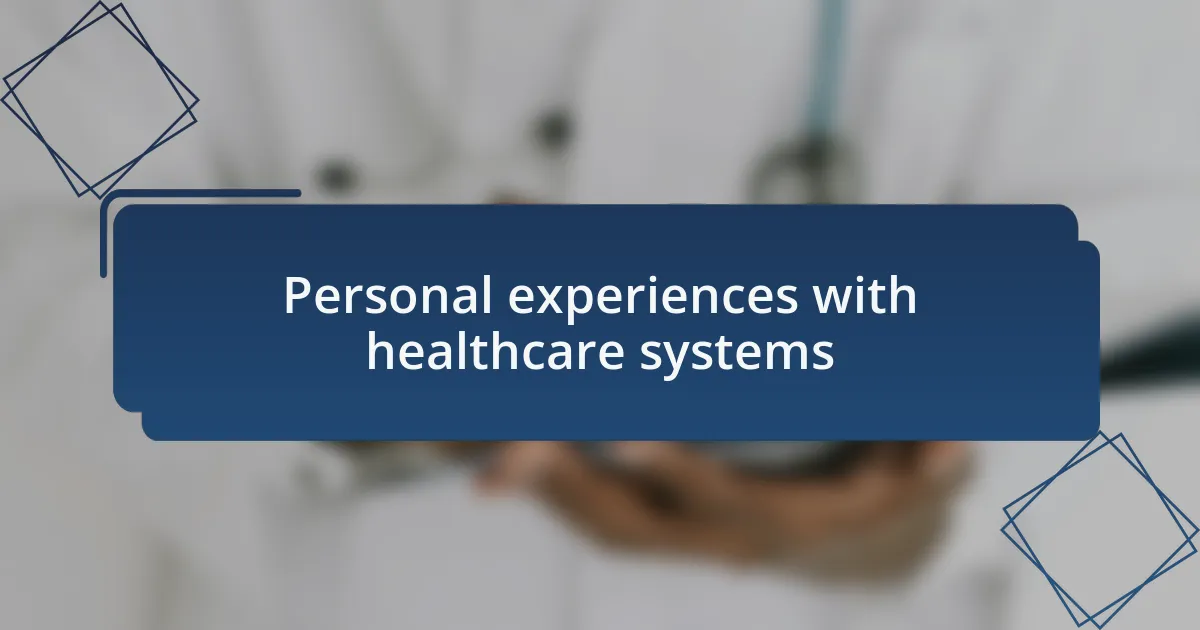
Personal experiences with healthcare systems
Navigating the healthcare system can often feel like walking through a maze, especially for those of us who have experienced its challenges firsthand. I remember visiting countless clinics, each time with a flicker of hope that this visit would yield the support our family needed. Unfortunately, more often than not, I walked away frustrated, feeling like a mere number rather than an individual with unique needs. Have you ever felt that wave of discouragement after being passed from one professional to another without finding real answers?
One moment that has stuck with me happened during a particularly lengthy appointment with a specialist. After sharing my concerns about my child’s care, I was met with a standard checklist of recommendations that felt completely disconnected from our reality. It struck me then that so many healthcare providers might lack awareness of the emotional nuances in caring for someone with cerebral palsy. Doesn’t it make you wonder how much empathy can shift the treatment experience for families?
I’ve also witnessed the power of peer support in addressing healthcare barriers. I joined a local support group where I met parents who shared their own stories of frustration and triumph in navigating the system. Hearing their experiences was validating, and it sparked not only meaningful conversations but also actionable insights that we could take back to our medical teams. How incredible is it that shared experiences can act as a catalyst for change in our pursuit of better healthcare?
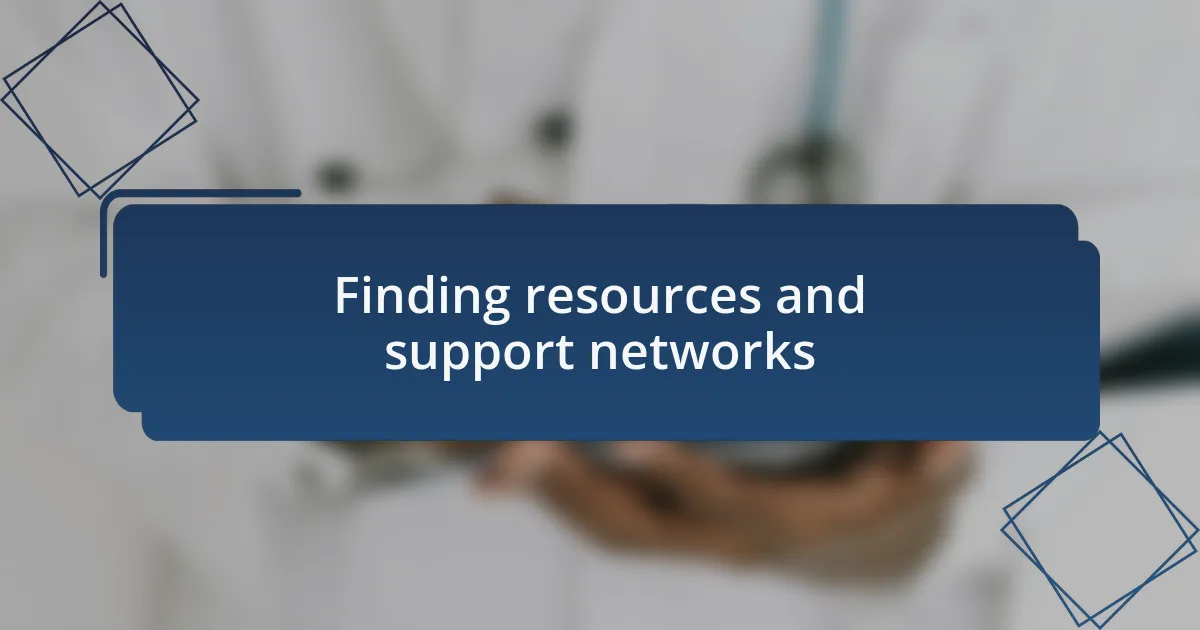
Finding resources and support networks
Finding the right resources and support networks can feel like searching for a hidden treasure. I once stumbled upon an online forum specifically for parents of children with cerebral palsy. The richness of shared experiences and the invaluable tips offered by other parents felt like a warm embrace, reminding me that I wasn’t alone in this journey. Have you ever wondered how much insight you might gain from connecting with those who truly understand your struggles?
In one of my visits to a community center, I discovered a wealth of information about local services dedicated to children with disabilities. The friendly staff guided me to various assistive technology programs I hadn’t even known existed. I left feeling empowered with options for my child’s development. Isn’t it amazing how a simple conversation can open doors to new possibilities?
Additionally, I realized the importance of building a personal network of advocates and mentors. By reaching out to those experienced in the field, I found incredible allies who shared resources and strategies tailored specifically to my family’s needs. Engaging with these individuals not only expanded my knowledge but also fostered a sense of belonging. Have you thought about how vital these connections could be in your journey?
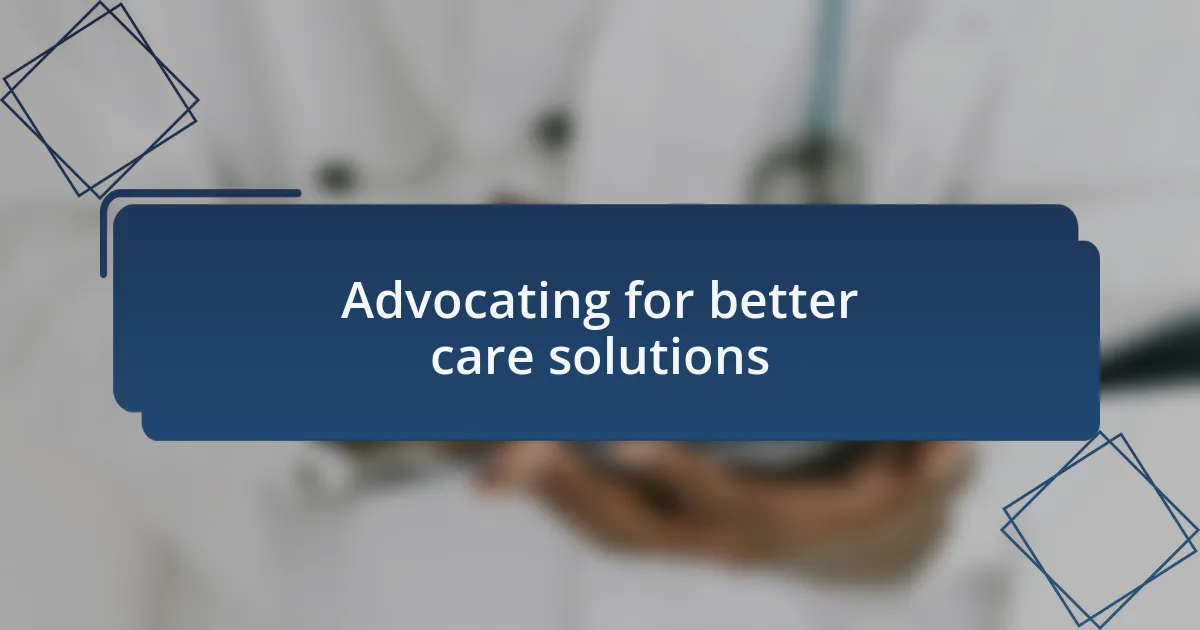
Advocating for better care solutions
Advocating for better care solutions has been a transformative part of my experience. I remember attending a town hall meeting focused on healthcare accessibility for individuals with disabilities. Standing up to share my story not only gave me a voice but connected me with others who faced similar challenges. Have you ever felt the power of speaking out in a room full of people who truly listened?
In my quest for better care options, I found that collaboration is key. I once joined a coalition of parents and health professionals dedicated to improving resources for children with cerebral palsy. By working together, we were able to influence local policies, pushing for more comprehensive therapy programs. This journey made me realize that when we unite our voices, we can become a formidable force for change. Just imagine how our collective stories can reshape the future of healthcare.
I also learned the importance of persistence in advocacy. After a frustrating experience with insurance coverage, I decided to reach out directly to the representatives. Through a series of conversations and emails, I showcased the necessity of certain therapies for my child’s development. It was exhausting, but the sense of achievement I felt when they agreed to cover these treatments was worth every moment. How often do we underestimate the difference we can make when we refuse to settle for less?